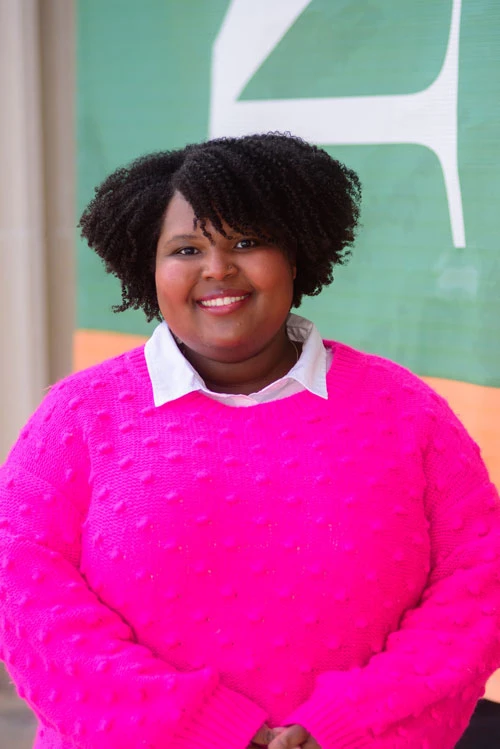Keshia Vilchert
Keshia Vilchert Discovered Her Purpose in Early Intervention
Feb 02, 2021
She began her academic career focused on becoming a pediatrician or other medical doctor, but now Keshia Vilchert, Ph.D. student, has discovered her purpose is in the area of early intervention—those services that are provided to those from birth to 3 years old with developmental disability or developmental delay.
Ms. Vilchert hails from Boston, Massachusetts, the only child of a larger extended family. Her initial adjustments to living, studying, and working at Marywood University presented her with challenges that most out-of-state college students experience—that of being homesick and without the support of family and friends from her hometown.
Ms. Vilchert explains, “I began my doctoral pursuit during the spring semester at Marywood. I found that most students had already settled into their routines as a result of their time during the fall semester—into their connections with other classmates.”
Thankfully, what became the routine of attending class, returning to her apartment, and calling home, quickly transitioned into connecting with faculty members, classmates, and becoming more involved in campus life.
Initially finding a connection with Amy Paciej-Woodruff, Ph.D., assistant professor of education at Marywood University, Ms. Vilchert then expanded her campus connections with other classmates, faculty, and administrators, including Yerodin Lucas, Ph.D., director of equity and inclusion and title IX coordinator; Lia Palmiter, Ph.D., director of student equity and inclusion; and with Ross Novak, dean of students.
Talking with Dr. Lucas, Ms. Vilchert was able to explore the opportunity of becoming a residence director, and Dr. Paciej-Woodruff reassured her that she would be able to explore more local opportunities once the weather broke.
Ms. Vilchert recalled one of her favorite memories of meeting with Ross Novak. “Ross had sent me an email. I thought I was in trouble. I mean, when the dean of students emails you—that can’t be good. But I was pleasantly surprised that he was reaching out to introduce himself to me, as we were taking a class together, and he simply wanted to connect.”
As a person of color, Ms. Vilchert explains that she feels supported in an individual sense. Explaining that she had always attended religious schools from primary school through to college, she feels comfortable attending Catholic mass, but identifies more with a Baptist Church. Sister Cathy Luxner, IHM provided her with a list of churches and communities that she could explore.
“I felt included and supported with this interaction. I remember thinking—Wow, this isn’t their faith, yet they are providing me the tools I need to feel included and supported,” Ms. Vilchert said.
In addition to being supported in her religious beliefs, Ms. Vilchert conveyed, “As a woman, and a woman of color, I find great support through Dr. Palmiter, and Dr. Lucas, and enjoy being a part of the committees and meetings regarding diversity efforts. Seeing diversity efforts in practice including the Black Lives Matter banner—it’s a great comfort, It makes me comfortable knowing that my campus community supports me.”
As a residence director, Ms. Vilchert takes pride in the many accomplishments of students that she knows personally. Those times when students' creative works are displayed in the art building, or when students are performing in theatre productions, music performances, etc., are some of the most outstanding memories for Ms. Vilchert.
Describing student artworks displayed as ‘A Museum of Wonderfulness’, Ms. Vilchert acknowledges that her best memories are of times when students can showcase the things they are working on, or performing the pieces at which they have excelled. In fact, one of her favorite memories is attending the inaugural ‘Research Slam’ event in February 2019.
Ms. Vilchert said, “Attending that research event was an awesome experience, as it gave me the opportunity to learn from my peers, to see and hear about what they were working on, and to learn about the collaborative process of their research. Events such as these, as well as other students’ works, performances, and graduations—especially that of S.O.A.R. (Students On-Campus Achieving Results, a program that encourages independent living and prepares students with autism) are invigorating experiences. They are what I’m most looking forward to post-pandemic.”
When asked what advice she would give to prospective or current students, Ms. Vilchert said, “To not feel locked into anything, including perceptions, majors, or jobs. There’s always time to try something new, to join a new group, to change your major. Don’t be afraid to make the change.
While initially planning on pursuing a medical degree, Ms. Vilchert found her purpose through relationship building with her patients and their families. “I found that, for myself, I wanted to pursue a more personal role, so I shifted a little bit to intervention, where I could apply my skills at advancing those relationships. Often, students aren’t aware of these options. We hear doctor, lawyer, nurse, etc., however, there are tons of career options outside of the ‘norms’ just waiting to be explored.”
Ms. Vilchert earned her undergraduate degree from Assumption College (University), Worcester, Mass., in biology with a concentration in neuroscience and behavior, and she earned her master’s degree from Springfield College, Springfield, Mass., in rehabilitation counseling with a concentration in pediatric developmental disabilities.
